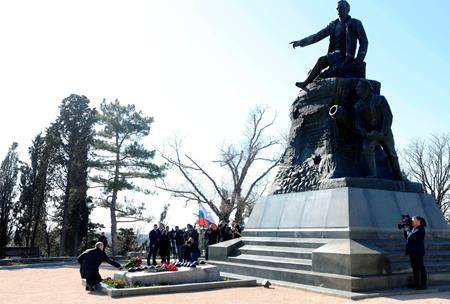Russian President Vladimir Putin marked the fifth anniversary of Russia’s annexation of Crimea from Ukraine by visiting the Black Sea peninsula on Monday, as NATO and the European Union once again strongly condemned the land grab.
Putin began his trip by attending the launch of new power plants in Crimea, part of Moscow’s efforts to upgrade the region’s infrastructure. Ukraine has cut off energy supplies to the peninsula and blocked shipments of Crimea-bound cargo via its territory after Moscow annexed the region in 2014.
“The situation has changed radically,” Putin said, adding that the new power facilities will fully cover Crimea’s needs.
Russia’s modernization effort has included the construction of a 19-kilometre bridge which opened last year across the Kerch Strait that links the Black Sea and the Sea of Azov. The $3.6-billion project gave Crimea a land link to Russia. Previously, a ferry crossing that was often interrupted by gales served as the only connection.
Russia has also beefed up its military presence in Crimea with new navy ships, missiles and warplanes.
Moscow’s annexation of Crimea drew U.S. and EU sanctions against Russia that hurt its economy.
READ MORE: Despite tensions in home countries, Ukrainian and Russian forge friendship in Kelowna
NATO allies said in a statement Monday that “we strongly condemn this act, which we do not and will not recognize.” They also criticized Russia’s military buildup in Crimea and alleged rights abuses including “arbitrary detentions, arrest, and torture” against members of the Crimean Tartar community.
NATO and the EU also called for the release of Ukrainian seamen who were seized by Russia in November’s standoff in the Black Sea.
Putin claims that Russia “re-integrated” Crimea after the ouster of Ukraine’s former pro-Russian president in 2014 to protect ethnic Russians who made up the majority of Crimea’s population from Ukrainian nationalists. The Kremlin was also worried that a new Ukrainian government could annul Russia’s lease on its key Black Sea navy base in Crimea and welcome NATO there instead.
Crimea was first seized by Russian forces in the 18th century under Catherine the Great.
The 27,000-square kilometre territory, roughly the size of Massachusetts, became part of Ukraine in 1954 when Soviet leader Nikita Khrushchev transferred jurisdiction from Russia, a move that was a mere formality until the 1991 collapse of the Soviet Union meant that Crimea landed in an independent Ukraine.
The Kremlin has argued that Khrushchev’s move violated then-Soviet law, making the transfer illegitimate.
Russian troops swept Crimea just days after the February 2014 ouster of Ukraine’s Russia-friendly president, catching the West by surprise. The Russian forces blocked Ukrainian soldiers at their garrisons, setting the stage for a hastily-called referendum in Crimea that the West denounced as illegitimate.
Putin on Monday hailed the referendum as a true expression of the Crimean people’s will, charging that the Western refusal to recognize it shows “disrespect for democratic principles.”
He also vowed to support various economic projects in Crimea. During a meeting with local residents that involved religious leaders, Putin said he had invited Turkish President Recep Tayyip Erdogan to attend the opening of a new mosque in the region and suggested also inviting Israeli Prime Minister Benjamin Netanyahu to visit a ceremony for unveiling a new synagogue.
The Associated Press



